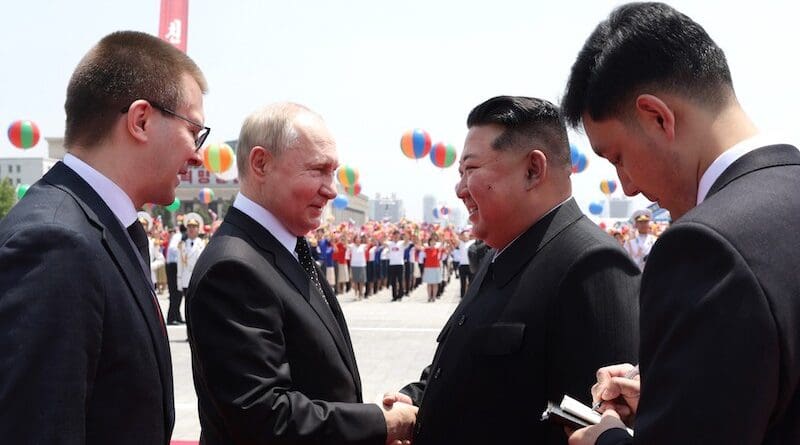The Dangerous Alliance: Analyzing The Putin-Kim Agreement And Its Global Implications
In a recent and alarming development, Russian President Vladimir Putin and North Korean leader Kim Jong Un signed a mutual defence pact, solidifying their alliance against perceived Western aggression. This agreement, which includes the potential use of nuclear weapons, signifies a new level of cooperation between these two nations. This paper delves into the implications of this pact for the international community and offers recommendations on how global leaders should respond. The best approach involves a blend of diplomacy and firm negotiation, aiming to engage rather than isolate these countries.
The agreement between Russia and North Korea encompasses several key components, including military cooperation, economic support, and technological exchanges. Both countries pledged mutual assistance in case of aggression, with a significant emphasis on nuclear capabilities. This pact marks a strategic shift, as both nations face increasing isolation and sanctions from the international community.
The inclusion of nuclear weapon use in the agreement raises significant concerns. North Korea’s ongoing development and testing of ballistic missiles and nuclear weapons have already heightened tensions in the Asia-Pacific region. The potential for Russia to enhance North Korea’s nuclear arsenal in exchange for munitions and other military support for its war in Ukraine presents a dire threat to global security.
The alliance between Russia and North Korea could destabilize global security in several ways Enhanced cooperation could lead to the transfer of advanced nuclear technology from Russia to North Korea, accelerating the latter’s nuclear capabilities and posing a significant threat to regional stability The agreement increases the risk of military confrontations, especially if either country perceives an imminent threat. The promise of mutual defence might embolden both nations to take more aggressive stances against their adversaries.
As both countries are already heavily sanctioned, their alliance could lead to more flagrant violations of international sanctions. This could undermine the effectiveness of global efforts to curb their aggressive behaviours.
Given the potential dangers of this alliance, the international community must respond strategically. A nuanced approach combining firm diplomacy and engagement is essential.
The international community, particularly Western democracies, should reinforce their alliances. This includes bolstering NATO’s presence in Eastern Europe and enhancing partnerships with countries in the Asia-Pacific region, such as South Korea and Japan.
Isolating Russia and North Korea further may only push them closer together. Instead, diplomatic channels should be kept open to negotiate terms that could potentially de-escalate tensions. Engaging in dialogue about arms control and non-proliferation can provide a platform for mitigating some of the risks posed by this agreement. While maintaining broad sanctions, the international community should consider more targeted measures that limit the capacity of both nations to support each other militarily. Sanctions should focus on preventing the transfer of specific technologies and materials that could enhance North Korea’s nuclear capabilities
Offering conditional economic incentives and humanitarian aid could persuade North Korea to adhere to international norms. This approach might also help to create internal pressure within North Korea for more open and cooperative foreign policies.
Addressing the challenges posed by the Putin-Kim agreement requires a balanced and comprehensive strategy. The international community must work together to implement measures that deter aggressive actions while encouraging cooperation and compliance with global norms.
Enhanced intelligence-sharing among allies is crucial to monitor and counteract any military developments stemming from this agreement. This includes tracking the movement of weapons and technology that could indicate an escalation in either country’s military capabilities.
Multilateral forums such as the United Nations should play a central role in addressing this issue. Resolutions condemning the agreement and reaffirming the commitment to global security can help to galvanize international support against the potential threats posed by this alliance.
Engaging in public diplomacy to inform global citizens about the dangers of this alliance can build international pressure against both countries. Highlighting the risks and advocating for peaceful resolutions can also garner widespread support for diplomatic efforts.
In conclusion, the agreement between Putin and Kim represents a significant challenge to global security. By adopting a strategic approach that blends diplomacy with firm actions, the international community can mitigate the risks and work towards a more stable and secure world. Maintaining open channels for negotiation, strengthening alliances, and implementing targeted sanctions are critical steps in addressing this complex issue.
The opinions expressed in this article are the author’s own.
References
- AP News. “Putin and Kim Jong Un Sign Mutual Defense Pact.” AP News, 2024. [Link](https://apnews.com/article/vladimir-putin-kim-jong-un-russia-north-korea-summit-ukraine-a6b8d2c12de7ee2ab6716d4747c9850e).
- BBC News. “Putin and Kim’s Dangerous Alliance.” BBC News, 2024. [Link](https://www.bbc.com/news/world-asia-56828368).
- Politico. “Putin and Kim Pledge Mutual Assistance Against Aggression.” Politico, 2024. [Link](https://www.politico.eu/article/putin-kim-jong-un-agreement).
- Yahoo News. “Kim Jong Un and Putin Sign Mutual Defense Pact.” Yahoo News, 2024. [Link](https://www.yahoo.com/news/kim-jong-un-putin-agreement).
- NBC News. “Putin’s Visit to North Korea: New Levels of Cooperation.” NBC News, 2024. [Link](https://www.nbcnews.com/news/world/putin-north-korea-summit).

